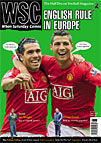 Johan Cruyff's latest revelation has only added to the idea that things are not always as they seem with the Dutch genius, says Derek Brookman
Johan Cruyff's latest revelation has only added to the idea that things are not always as they seem with the Dutch genius, says Derek Brookman
A 30-year-old story recently exploded back into life when Johan Cruyff gave what would appear to be the definitive explanation for his non-participation in the 1978 World Cup in Argentina.
There were already several explanations doing the rounds. The player himself had said at the time that his absence was due to being neither physically nor mentally prepared, though few believed that this was the real reason. It was widely thought that he found the idea of playing football in a country run by a military dictatorship too objectionable. Then there was also the claim that his wife Danny had refused him permission because of the infamous “swimming pool incident” which supposedly took place days before the 1974 World Cup final. According to a journalist from the German Bild magazine, several naked German women and a number of Dutch players, including Cruyff, took a dip together at the team hotel.
But the three-time European Footballer of the Year told an interviewer on Catalunya Radio in mid-April this year that he missed the tournament because an intruder attempted to take his family hostage at gunpoint at their home in September 1977. In the wake of this terrifying ordeal, the family were given protection which went as far as policemen sleeping in their living room and an escort for the car used to take the children to school. “After that I never thought for a second about going to Argentina,” Cruyff later elaborated on a programme being recorded for Dutch TV. “Anyone who would leave their family behind under such conditions isn’t right in the head.”
He also explained why it had taken so long to present this version of events, “I was told not to mention the incident at the time, in case it gave others ideas. But the problem is that now, 30 years later, people still say that my wife stopped me from going to Argentina. I thought it was time to reveal the truth.”
However, it is not immediately obvious whether Cruyff’s story clears up the matter or just further muddies the waters. For a start, details of the botched kidnapping have long been in the public domain; it was reported in the newspapers at the time and has also been mentioned in a couple of books. More specifically, he was quoted in Voetbal International during the 1974 finals as saying that “this will be my first and last World Cup.” Paul Onkenhout, a Dutch football journalist, also says Cruyff told the BBC in February 1977, a full seven months before the gunpoint drama, that he definitely wouldn’t be going to Argentina. While it was unquestionably a dreadful experience for Cruyff’s family, it is also possible that the incident is now being used to deflect criticism from Danny, who is still regarded by many as the main culprit.
Cruyff’s ways are often difficult to fathom. In February of this year, for example, a top-level meeting was taking place at the Amsterdam Arena to discuss a report drawn up by an independent commission on the future of Ajax. The world’s most famous number 14 just happened to be driving around town that evening, so he claims, and found himself at the entrance to the stadium. He subsequently joined the meeting and a few hours later had been appointed to oversee and revamp all footballing activities. This was his first official position at any club since leaving Barcelona in 1996, and came as a complete surprise to everyone (evidently his wife heard the news on TV). Obviously those associated with Ajax were delighted that their patriarch was finally back in an active role, especially in tandem with his former protégé Marco van Basten. After years of underachievement and internal wrangling, the future suddenly looked bright in Amsterdam.
A few weeks later there was an even greater shock; Cruyff was gone. He had disagreed with Van Basten about reforming the youth development system and promptly relinquished his role. It was scarcely believable that his renewed involvement in the club that means so much to him was over before it even started, but on the other hand it demonstrates once again that, with Johan Cruyff, things are not always what they seem.
From WSC 256 June 2008